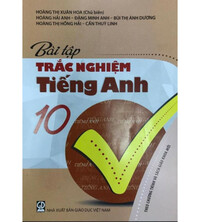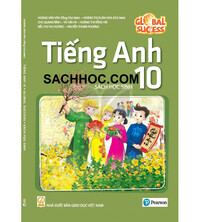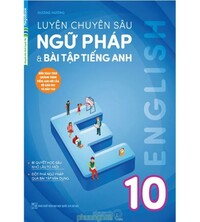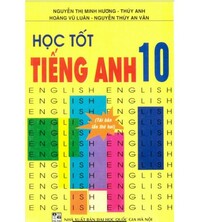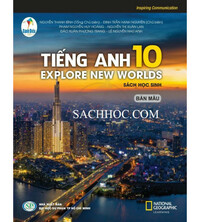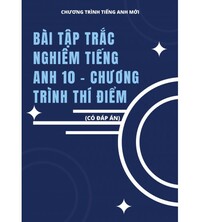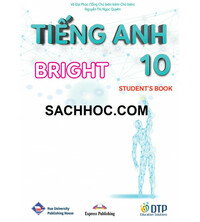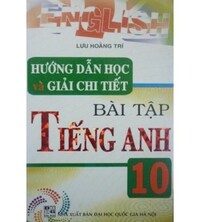Đề thi cuối kì 2 lớp 10 môn tiếng Anh có đáp án
Đề thi tiếng Anh 10 học kì 2 năm 2021 dưới đây nằm trong bộ đề thi học kì 2 tiếng Anh lớp 10 có đáp án do Tìm Đáp Án sưu tầm và đăng tải. Đề thi tiếng Anh học kì 2 lớp 10 có đáp án được biên tập bám sát chương trình SGK tiếng Anh lớp 10 mới giúp các em ôn tập Từ vựng - Ngữ pháp tiếng Anh trọng tâm.
I. Read the following passage and choose the option (A, B, C or D) that best answers each question.
Copenhagen
In spite of being the capital of one of Europe’s smallest countries, the clean and friendly city of Copenhagen offers a host of cultural and sightseeing opportunities. With a vast number of pedestrianised streets, the best way to sightsee is by foot, or you may prefer a leisurely canal cruise past the colorful waterfront houses.
Sights not be missed include Rosenborg Castle which houses the Crown Jewels, Amalienborg Palace, the Little Mermaid and the famous Tivoli Gardens with a myriad of restaurants and bars, concert halls and a fairground offering something for everyone. Also worth a visit is the Viking Museum and for something different why not tour the Carlsberg Brewery. Shoppers will enjoy the fine shops of the Stroget and don’t forget the side-streets leading from it. After sunset, head for Nyhavn quayside.
“A rarity among capital cities - it does not overwhelm you, but rather takes you gently in and shows you its sights with quiet pride. The Little Mermaid is smaller than you imagined (but she is, after all, “Little”) and there isn’t a single inch of neon among the light bulbs of Tivoli.” - John Carter.
1. It can be inferred that Copenhagen . . . . . . . . . .
A. is the smallest capital city in Europe.
B. is the capital of a European country.
C. is the capital of the smallest country in Europe.
D. All are correct.
2. Which of the following is NOT true about Copenhagen?
A. Visiting the city, you can enjoy the sights and learn about its cultures.
B. It’s advisable to tour the city on foot.
C. Cars and other vehicles are not allowed in many of Copenhagen streets.
D. You can’t drive in the city because the streets are so narrow.
3. According to the text, tourists . . . . . . . . . .
A. can have food and drinks or entertainment in the Tivoli Gardens.
B. will not remember the sights.
C. should not visit many places including Amalienborg Palace.
D. can make a tour of the Carlsberg Brewery for some music.
4. Which of the following statements is true?
A. There are more light bulbs than neon lights in Tivoli.
B. The Little Mermaid is too small to enjoy.
C. Visitors can do the shopping in the Stroget only.
D. Nyhavn quayside is a place to visit in the evening.
II. Choose the one (A, B, C or D) that best completes each sentence.
5. Jane . . . . . . . . . . a sweet dream when the alarm clock . . . . . . . . . .
A. had/ rang B. was having/ rang
C. was having/ was ringing D. had had/ was ringing
6. She’s . . . . . . . . . . fascinating woman. Do you know she’s . . . . . . . . . . leader of the opposition party?
A. a/ Ø B. a/ the C. the/ a D. Ø/ Ø
7. It . . . . . . . . . . that the strike will end soon.
A. is hoped B. are hoped C. hopes D. hoped
8. You’re very quiet. What . . . . . . . . . . about?
A. will you think B. are you thinking C. do you think D. have you thought
9. People often visit Kyoto in April, . . . . . . . . . . they can see the beautiful cherry blossoms.
A. where B. that C. when D. which
10. “. . . . . . . . . .” in the sentence below is not correct.
Despite (I) being good at (II) math, but (III) he couldn’t solve the problem (IV).
A. II B. III C. I D. IV
11. “. . . . . . . . . .” in the sentence below is not correct.
You shouldn’t worry (I) too much (II) for (III) your children; they’re grown up (IV) now.
A. IV B. II C. I D. III
12. “Would you like to come to my birthday party, Sarah?” asked Frederic. is closest in meaning to “. . . . . . . . . .”
A. Frederic invited Sarah to his birthday party.
B. Frederic asked Sarah if she liked his birthday party or not.
C. Frederic reminded Sarah of his coming birthday party.
D. Frederic asked if Sarah was able to come to his birthday party.
13. They helped me a lot. I don’t know what I . . . . . . . . . . without their help.
A. would do B. had done C. have done D. would have done
14. . . . . . . . . . . the storm, the ship couldn’t reach its destination on time.
A. Although B. Because of C. In spite of D. Because
15. Would you answer . . . . . . . . . . telephone, please? I’m trying to lull . . . . . . . . . . baby.
A. the/ a B. a/ a C. a/ the D. the/ the
16. “How about driving to the countryside this Sunday?” - “. . . . . . . . . .”
A. That’s a good idea! B. Never mind.
C. Yes, I’m driving. D. That’s my pleasure!
17. The book . . . . . . . . . . is on the top shelf is a present from my friend.
A. who B. that
C. Ø D. Both B and C are correct
18. He turned off the lights before going out . . . . . . . . . . waste electricity.
A. so that not B. so as not to C. as not to D. in order that not
19. We were all . . . . . . . . . . to hear about the breakup of their marriage.
A. shocking B. shock C. shocked D. feel shocked
20. He is trying to buy the same ring . . . . . . . . . . he lost two months ago.
A. that B. which C. Ø D. All are correct
21. In my mother’s . . . . . . . . . ., it is essential to eat a big breakfast.
A. opinion B. feeling C. idea D. confidence
22. She won the first prize in the drawing . . . . . . . . . .
A. competitive B. competitor C. compete D. competition
23. “If I were you, I would take the job,” said my roommate. is closest in meaning to “. . . . . . . . .”
A. My roommate was thinking about taking the job.
B. My roommate introduced the idea of taking the job to me.
C. My roommate advised me to take the job.
D. My roommate insisted on taking the job for me.
24. “. . . . . . . . . .” in the sentence below is not correct.
A language is considered (I) dead when (II) it no longer used (III) for oral communication (IV).
A. III B. I C. II D. IV
25. Please keep your voice down in this section of the library. If you . . . . . . . . . . to talk loudly, I . . . . . . . . . . to ask you to leave.
A. had continued/ would have had B. continue/ would have
C. continue/ will have D. continued/ would have
26. Mr. Jones, . . . . . . . . . . I was working for, was very generous about overtime payments.
A. whom B. that C. Ø D. All are correct
27. “I think I’m going to miss my train.” - “Well, . . . . . . . . . . you to the station.”
A. I’m going to take B. I would take C. I’ll take D. I’m taking
28. “. . . . . . . . . .” in the sentence below is not correct.
When (I) have you been (II)? I’ve been looking (III) for you for hours (IV).
A. III B. I C. IV D. II
29. “How often do you go to school?” - “. . . . . . . . . .”
A. I go there by bus B. I don’t think so.
C. Every day except Sunday. D. I go there early.
30. “He last had his eyes tested ten months ago.” is closest in meaning to “. . . . . . . . . .”
A. He hasn’t tested his eyes for ten months.
B. He had tested his eyes ten months before.
C. He didn’t have any test on his eyes in ten months.
D. All are correct.
31. “. . . . . . . . . .” in the sentence below is not correct.
Julie failed (I) her driving test (II) because (III) she hasn’t practiced (IV) enough.
A. IV B. III C. II D. I
32. You will become ill if you . . . . . . . . . . working so hard.
A. don’t stop B. won’t stop C. didn’t stop D. haven’t stopped
Trên đây là Đề thi học kì 2 lớp 10 tiếng Anh có đáp án. Mời bạn đọc tham khảo thêm nhiều tài liệu ôn tập Tiếng Anh 10 cả năm khác như: Để học tốt Tiếng Anh lớp 10, Đề thi học kì 1 lớp 10, Đề thi học kì 2 lớp 10, Bài tập Tiếng Anh lớp 10 theo từng Unit trực tuyến,.... được cập nhật liên tục trên Tìm Đáp Án.
Ngoài ra, Tìm Đáp Án đã thành lập group chia sẻ tài liệu học tập lớp 10 THPT miễn phí trên Facebook: Tài liệu học tập lớp 10. Mời các bạn học sinh tham gia nhóm, để có thể nhận được những tài liệu đầy đủ các môn học mới nhất.
